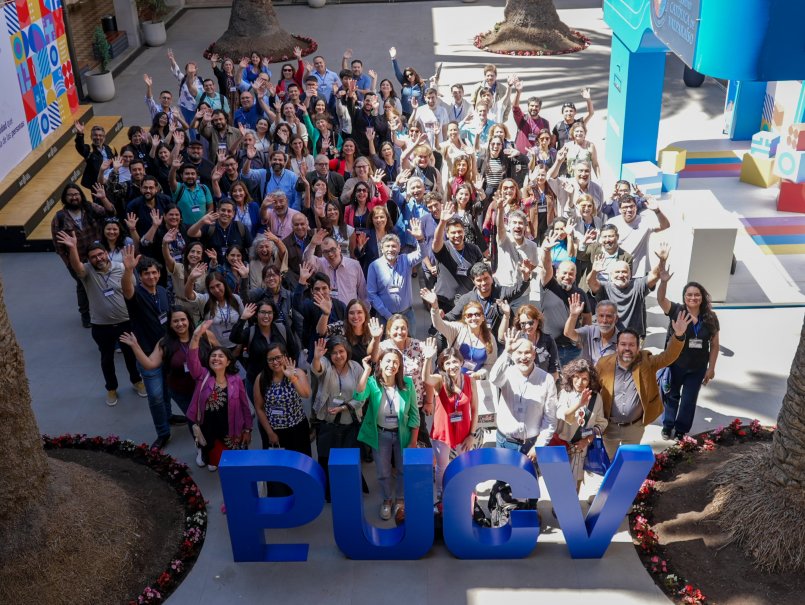
How scientific communication can bring technology and science closer to the community was the central topic of the Multiplica STEM encounter, which took place for the second year at our university and that was organized by the projects Science Up, InES Gender and InES I+D from the Vicerectory of Research, Creation and Innovation, together with the areas of Women’s Leadership and Participation of the Engineering Department and the Transference and Licensing Office (OTL) at the PUCV.
The purpose of the event was to promote scientific communication from university spaces on knowledge creation, fostering creative opportunities that are accessible and inspire more people to discover the relevance of STEM disciplines (Science, Technology, Engineering and Mathematics).
Inspirational Talks: Science, Technology and Creativity
This edition had the participation of Valentina Muñoz Rabanal (@chica.rosadita), feminist activist and programmer, known for being the youngest contributor to the development of the First National Policy on Artificial Intelligence and designated in 2021 as an advocate for Sustainable Development Goals by the UN Secretary General.
During her presentation, “Technologies for a planet in crisis”, she addressed the importance of the incorporation of ethics in engineering education, especially in the creation of science and technology with sense, from and for the people, and how this can contribute to build a more inclusive and sustainable world. “It is relevant that we stop centralizing all events in Santiago and that we bring these types of activities and powerful speakers to regions, so they connect and can also send a message to young people that science, culture, and education are also here”, she noted.
For his part, chef, scientific communicator and culinary communicator, Heinz Wuth Estefane (@soycienciaycocina), who combines science and gastronomy in his project “I am Science and Cooking”, highlighted the importance of understanding science as evidence, explaining how this discipline has a direct impact on cooking by helping to better understand the processes that happen in the kitchen. Thanks to this knowledge, he said it is possible to find innovative solutions and optimize culinary results.
Likewise, Wuth explained that “this type of encounter shows how necessary these spaces for reflection and learning are. It is necessary to especially understand that, from my field, which is cooking, we can learn much more: going beyond just cooking a recipe, understanding how it works, why it works, how to conserve it better. These opportunities are very valuable, because we get to learn a lot from other specialties too. It is very positive that the university creates these spaces”.
Connection and Learning from the kitchen
Vicerector of Research, Creation and Innovation, Luis Mercado, pointed out that activities like Multiplica STEM allow to connect science with everyday life. “Within the goals of our institutional projects is the connection with our surroundings and society. In today’s activity we saw how different actions that can be part of the routine in everyday life have aspects of science, technology, engineering or mathematics. This is what we want to promote through our institutional projects: that both those who are involved in the university and also external participants, especially high-school students, are able to see that the research activities in the STEM areas not only are related to theoretical or complex experimental aspects, but also to everyday and practical issues”.
Rodrigo González, Regional Ministry Secretary of Science, Technology, Knowledge and Innovation, highlighted the role of communication in bringing science closer to new audiences. “These meetings of people with science communicators and with whom have the role of communicating science in other spaces, such as social media or the press, are essential, since these are experiences we do not have every day, both for students and the PUCV ecosystem and invited guests”, he indicated.
Finally, Carolina Astudillo, scholar at the School of Food, valued the opportunity as a chance for transforming education. “I think this is a fantastic initiative. It is very encouraging for our students at all levels. Personally, as a scholar in our School of Food, I made sure that some of my students could participate in this opportunity, especially thinking that we are all fans of Soy Ciencia y Cocina. Their capacity for scientific communication that La Chica Rosadita and Soy Ciencia y Cocina have is fantastic in so many ways. It is very encouraging, because it plants a seed of curiosity and the desire to move forward in providing knowledge to our children and young people. Therefore, I greatly value the work they are doing”, she concluded.
By Antonia Pizarro
Vicerectory of Research, Creation and Innovation



